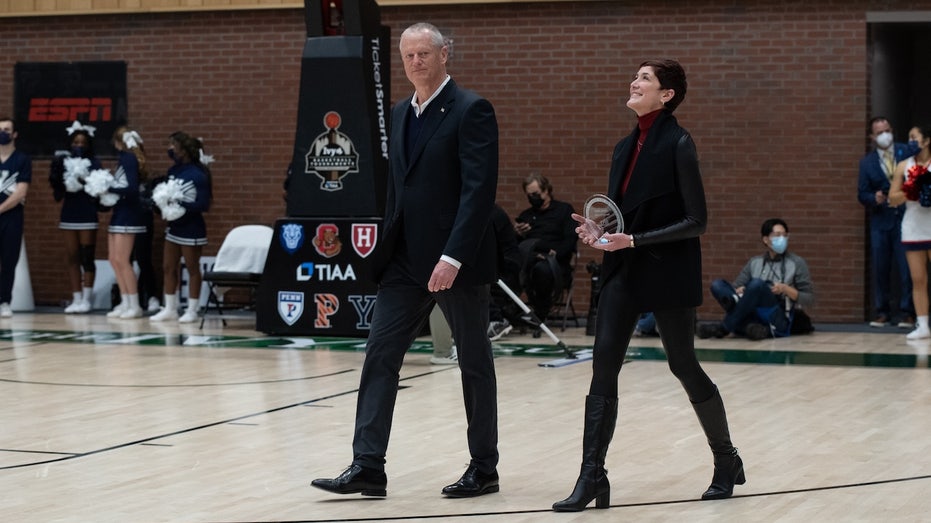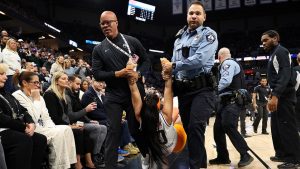NCAA president Charlie Baker was the subject of harsh scrutiny after defending the organization’s current policies that have allowed trans athletes to compete against women during a senate hearing on Tuesday.
Baker addressed the issue again during an interview on ESPN’s “The Pat McAfee Show” Thursday. When McAfee asked Baker how the parents of daughters should feel about trans athletes in women’s sports and the NCAA’s record on it, the president made it a point to minimize the impact of the issue.
“There are 510,000 college athletes playing in the NCAA, there are less than 10 transgender athletes, so it’s a small community to begin with,” Baker said.
CLICK HERE FOR MORE SPORTS COVERAGE ON FOXNEWS.COM
It was the same statistic that Baker offered in Washington, D.C., on Tuesday when asked about the specific numbers. Sen. Dick Durbin, D-Ill. faced backlash as well when he posted a clip of Baker providing the stat with a caption that read, “Let’s focus on ways to actually improve women’s sports.”
At that hearing, Baker also suggested that women athletes who feel alienated by sharing a locker room with trans athletes “should have an opportunity to use other facilities if they wish to do so.”
On Thursday Baker repeated the same justification for the NCAA’s policies during the interview with McAfee. Baker referenced five recent court rulings that have enabled trans athletes to compete against biological females in the last 15 months. On Tuesday, he referenced five cases in the last 18 months.
Only one ruling enabled a trans athlete to compete at the college level. He has not specifically identified any of the other cases, but mentioned that some have occurred at the high school level.
The ruling that he has reference was by Colorado district Judge Kato Crews in November, that allowed trans volleyball player Blaire Fleming to compete in the Mountain West Tournament for San Jose State University. That ruling after an emergency injunction by other players in the conference to have the athlete removed from competition.
Crews wrote that the plaintiffs’ request for an emergency delay “was not reasonable” and “would risk confusion and upend months of planning and would prejudice, at a minimum, [San Jose State] and other teams participating in the tournament.”
However, Crews’ ruling did not address the issue of trans inclusion at a macro level. It simply rejected a proposal that would disqualify a player, and potentially an entire team, from a conference tournament.
The other federal rulings on this issue in the last 18 months have focused on the issue occurring at the high school and youth levels. This includes a ruling in Arizona in September that blocked a state law preventing two prepubescent trans athletes from competing in girls’ sports. In April, a ruling in West Virginia blocked a law that would have prevented a 13-year-old biological male from competing in girls’ cross-country.
Judges Landya McCafferty of New Hampshire and M. Hannah Lauck of Virginia, who were both appointed during the Obama administration, each issued rulings this year that enabled biological males to play on high school girls’ soccer and tennis teams. McCafferty issued an order that allowed two transgender athletes to compete in New Hampshire, and Lauck ruled that an 11-year-old transgender tennis player was allowed to compete against girls the same age in Virginia.
During the McAfee interview on Thursday, Baker said he is open to working toward a clear federal policy on the issue.
“I would love to work with people in Washington to create a federal standard around this issue, because right now we don’t have one, and it’s a problem,” Baker said. “And I accept that it’s an enormously controversial and challenging issue, but right now if you look at the way these issues are getting decided in court, courts are deciding in favor of participation. So, we are abiding by the way they’re deciding this.”
During Thursday’s interview, McAfee, who expressed his desire to have his daughter play sports when she’s older, ended the conversation by praising Baker on ESPN’s airwaves for his handling of the situation.
“I think you’ll get it right, Charlie, I think you have done a fantastic job since taking over the help, I think you’ve been phenomenally transparent through it all and I can’t thank you enough for making us sports stooges a little bit smarter,” McAfee said.
McAfee previously said he believes that “men have a clear advantage” over women in sports while speaking about the controversy involving Algerian Boxer Imane Khelif at the Paris Olympics this summer.
“I know that it’s not every woman and not every male physical body. We’re not talking about souls, we’re talking about physical bodies, but at those high level of competition, there is a clear advantage,” McAfee said on Aug. 1. “There always has been, and I assume there always will be, and I hope we get to a point that we can all agree on this. I think we all feel the same way about this.”
Follow Fox News Digital’s sports coverage on X, and subscribe to the Fox News Sports Huddle newsletter.
NCAA president Charlie Baker was the subject of harsh scrutiny after defending the organization’s current policies that have allowed trans athletes to compete against women during a senate hearing on Tuesday.
Baker addressed the issue again during an interview on ESPN’s “The Pat McAfee Show” Thursday. When McAfee asked Baker how the parents of daughters should feel about trans athletes in women’s sports and the NCAA’s record on it, the president made it a point to minimize the impact of the issue.
“There are 510,000 college athletes playing in the NCAA, there are less than 10 transgender athletes, so it’s a small community to begin with,” Baker said.
CLICK HERE FOR MORE SPORTS COVERAGE ON FOXNEWS.COM
It was the same statistic that Baker offered in Washington, D.C., on Tuesday when asked about the specific numbers. Sen. Dick Durbin, D-Ill. faced backlash as well when he posted a clip of Baker providing the stat with a caption that read, “Let’s focus on ways to actually improve women’s sports.”
At that hearing, Baker also suggested that women athletes who feel alienated by sharing a locker room with trans athletes “should have an opportunity to use other facilities if they wish to do so.”
On Thursday Baker repeated the same justification for the NCAA’s policies during the interview with McAfee. Baker referenced five recent court rulings that have enabled trans athletes to compete against biological females in the last 15 months. On Tuesday, he referenced five cases in the last 18 months.
Only one ruling enabled a trans athlete to compete at the college level. He has not specifically identified any of the other cases, but mentioned that some have occurred at the high school level.
The ruling that he has reference was by Colorado district Judge Kato Crews in November, that allowed trans volleyball player Blaire Fleming to compete in the Mountain West Tournament for San Jose State University. That ruling after an emergency injunction by other players in the conference to have the athlete removed from competition.
Crews wrote that the plaintiffs’ request for an emergency delay “was not reasonable” and “would risk confusion and upend months of planning and would prejudice, at a minimum, [San Jose State] and other teams participating in the tournament.”
However, Crews’ ruling did not address the issue of trans inclusion at a macro level. It simply rejected a proposal that would disqualify a player, and potentially an entire team, from a conference tournament.
The other federal rulings on this issue in the last 18 months have focused on the issue occurring at the high school and youth levels. This includes a ruling in Arizona in September that blocked a state law preventing two prepubescent trans athletes from competing in girls’ sports. In April, a ruling in West Virginia blocked a law that would have prevented a 13-year-old biological male from competing in girls’ cross-country.
Judges Landya McCafferty of New Hampshire and M. Hannah Lauck of Virginia, who were both appointed during the Obama administration, each issued rulings this year that enabled biological males to play on high school girls’ soccer and tennis teams. McCafferty issued an order that allowed two transgender athletes to compete in New Hampshire, and Lauck ruled that an 11-year-old transgender tennis player was allowed to compete against girls the same age in Virginia.
During the McAfee interview on Thursday, Baker said he is open to working toward a clear federal policy on the issue.
“I would love to work with people in Washington to create a federal standard around this issue, because right now we don’t have one, and it’s a problem,” Baker said. “And I accept that it’s an enormously controversial and challenging issue, but right now if you look at the way these issues are getting decided in court, courts are deciding in favor of participation. So, we are abiding by the way they’re deciding this.”
During Thursday’s interview, McAfee, who expressed his desire to have his daughter play sports when she’s older, ended the conversation by praising Baker on ESPN’s airwaves for his handling of the situation.
“I think you’ll get it right, Charlie, I think you have done a fantastic job since taking over the help, I think you’ve been phenomenally transparent through it all and I can’t thank you enough for making us sports stooges a little bit smarter,” McAfee said.
McAfee previously said he believes that “men have a clear advantage” over women in sports while speaking about the controversy involving Algerian Boxer Imane Khelif at the Paris Olympics this summer.
“I know that it’s not every woman and not every male physical body. We’re not talking about souls, we’re talking about physical bodies, but at those high level of competition, there is a clear advantage,” McAfee said on Aug. 1. “There always has been, and I assume there always will be, and I hope we get to a point that we can all agree on this. I think we all feel the same way about this.”
Follow Fox News Digital’s sports coverage on X, and subscribe to the Fox News Sports Huddle newsletter.













